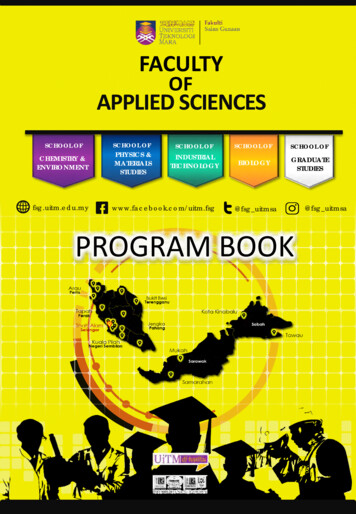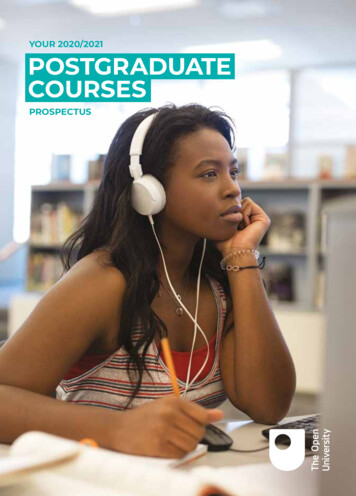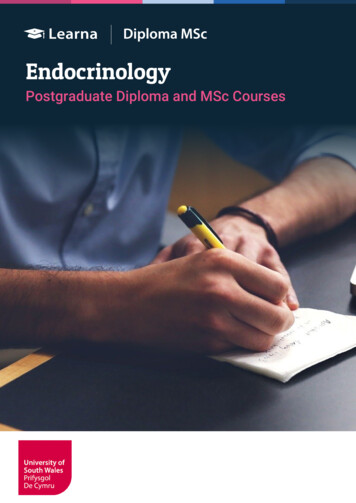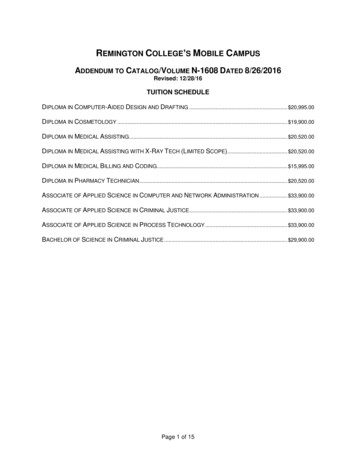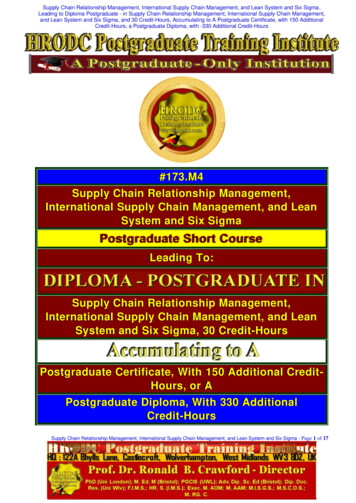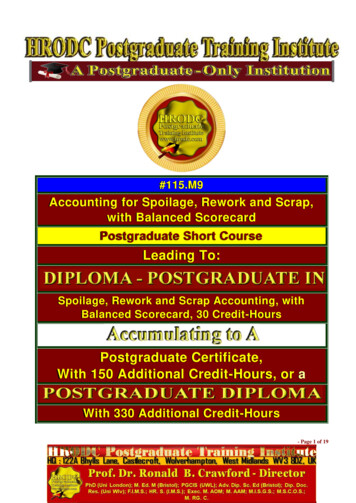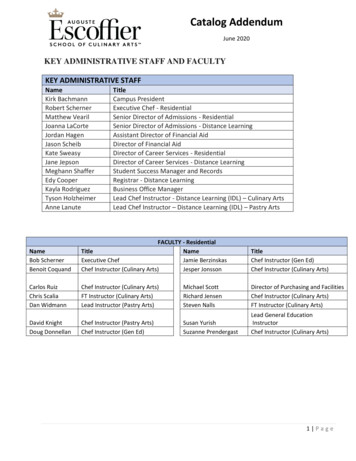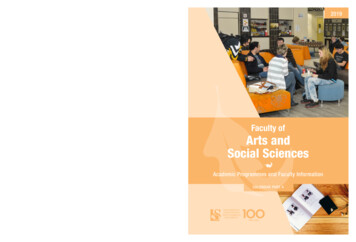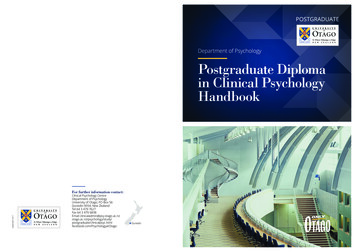
Transcription
Department of PsychologyPostgraduate Diplomain Clinical PsychologyHandbookSeptember 2017For further information contact:Clinical Psychology CentreDepartment of PsychologyUniversity of Otago, PO Box 56Dunedin 9054, New ZealandTel 64 3 479 7627Fax 64 3 479 6838Email /PsychologyatOtagoDunedin
DEPARTMENT OFPsychologyPostgraduate Diploma inClinical Psychology1
CONTENTSINTRODUCTION AND ORIENTATION . 4DEPARTMENT OF PSYCHOLOGY . 5OVERALL STRUCTURE OF TRAINING PROGRAMME . 6CRITERIA FOR ADMISSION . 8REGULATIONS FOR THE POSTGRADUATE DIPLOMA . 9CLINICAL GRADUATE PROFILE . 11Clinical Psychology Centre contact informa on:ADMINISTRATION . 15Dr Dione HealeyDirector Clinical Programme, Department of PsychologyTRAINING ADVISORY COMMITTEE . 15Clinic Phone: 64 3 479 7620Clinic Fax:64 3 479 6838Clinic Email: clinicaladmin@psy.otago.ac.nzSYLLABUS . 16RESEARCH . 20Department of Psychology contact informa on:FACILITIES . 23Address:Phone:William James Building, 275 Leith Walk, Dunedin, 901664 3 479 7644FINANCE AND VACATIONS . com/PsychologyatOtagoEXAMINATIONS AND ASSESSMENT OF STUDENTS . 24APPLICATIONS . 27OTAGO CLINICAL PSYCHOLOGY GRADUATES . 2823
DEPARTMENT OF PSYCHOLOGYINTRODUCTION AND ORIENTATION1.2.A career in Clinical Psychology has become a major professional choicefor many psychology graduates. Clinically qualified psychologists areemployed in human service fields, including the District Health Boards,the Correc ons Psychological Services, private prac ce, and othersocial welfare and counselling agencies. From a beginning in whichclinical psychologists were employed primarily as testers to assistin the diagnosis of psychiatric pa ents, their service contribu onshave gradually broadened over the past 30 years to include not onlythe treatment and rehabilita on of psychiatric pa ents, but also thepsychological care of non-psychiatric pa ents, health educa on, andcommunity welfare. In all these areas psychologists and, in par cular,clinical psychologists, have also played a key role in research and inthe teaching of health service professionals.The training model adopted at Otago is that of the scien st/prac oner.We believe that Clinical Psychology is the applica on of the methodsand findings of scien fic psychology to the analysis and allevia onof those individual, interpersonal, and community problems that areconfronted by the health and social services. Therefore, a thoroughundergraduate educa on in psychology is the essen al basis forclinical training. A er training it is important that clinical psychologistscon nue to keep themselves well-informed about developments ingeneral psychology so that they can respond to new knowledge andclinical methods.3.As applied scien sts, clinical psychologists are expected to adhere asrigorously to accepted scien fic standards as the prac cal demandsof clinical se ngs will allow. In an equally important sense they arealso commi ed to serving the community and to offering help to thosein psychological distress. We believe that a successful clinical courseis one in which the integra on of academic coursework, research,and prac cal training in clinical skills creates a harmony between thescien fic and humanitarian objec ves.4.All persons who prac ce as psychologists in New Zealand are requiredto be registered under the Health Prac oners Competency AssuranceAct. Comple on of the Postgraduate Diploma in Clinical Psychologyand a Masters or PhD degree at Otago allows registra on under theClinical Psychologist voca onal scope.41.The Department of Psychology is in the Division of Sciences. Studentsmay take Psychology as either an Arts or Science degree and nodis nc on is made between the two types of degree in terms of courseor programme structure.2.The present academic establishment consists of eleven full professors,three emeritus professors, four associate professors, nine seniorlecturers, two lecturers, four professional prac ce fellows, two teachingfellows and nine research and postdoctoral fellows. The technical,administra ve, and secretarial staff provide enthusias c and skilledassistance over a wide range of teaching and research areas.3.The Department’s research strengths lie in the general areas ofapplied psychology, behavioural neuroscience, clinical psychology,cogni on, compara ve psychology, developmental psychology, neuropsychology, percep on, and social psychology. Development of studentresearch skills is an important priority of the Department and theClinical Psychology programme. The Department has a well-equippedworkshop, an extensive computer network, and neurosciencelaboratories.4.Academic staff primarily responsible for teaching the ClinicalPsychology course are Professor Richie Poulton, Associate ProfessorMartin Sellbom, Dr Elizabeth Schaughency, Dr Richard Linscott,Dr Dione Healey, Jo Prince, and Sasha McComb, (Director, ClinicalPsychology Centre). All ma ers concerning Master’s degrees are theresponsibility of Associate Professor Liana Machado (Sem 2 in 2018and Sem 1 in 2019) and Dr Richard Linsco (from Sem 2 in 2019).The responsibility for Doctoral degrees lies with Associate ProfessorJackie Hunter.5
OVERALL STRUCTURE OF TRAININGPROGRAMME1.Prerequisites for Programme Entry. To be eligible for admission to theprogramme, applicants must have completed the requirements of aBachelor of Arts or Bachelor of Science in Psychology, or equivalent.To be admi ed to 400-level courses in Psychology, students must havecompleted PSYC 311 (or the equivalent at another University).2.DuraƟon of Course and QualificaƟons Completed During Training.Allstudents admitted to the programme complete at least threecalendar years of study. During the first year, students typicallycomplete a Bachelor of Arts with Honours or a Bachelor of Sciencewith Honours in Psychology, or the equivalent. During the secondand third years (also called the first and second professional years),students complete the Postgraduate Diploma in Clinical Psychologyconcurrently with a Master of Arts or Master of Science in Psychology(by thesis only). There are two common varia ons to this. In somecases, students complete a Doctor of Philosophy in Psychology insteadof a Master’s degree and, in doing so, undertake at least two addi onalyears of study. In other cases, students subs tute the Honours degreein the first year with the coursework component of a Master of Arts orMaster of Science in Psychology (by papers and thesis) and, in doingso, complete two qualifica ons over three years. From me to me,case-by-case varia ons are permi ed (eg, if the student already holdsa Master’s or PhD research degree in Psychology).3.Provisional Admission and the Probationary Year. If successful,applicants are provisionally admi ed to the programme. Admissionremains provisional for 12 months. During this proba onary period,students complete the first of the three years of the programme. Duringthe proba onary year, all students complete PSYC 401–PSYC 406 andPSYC 428 and PSYC 435 regardless of the qualifica on for which theyare enrolled. Honours students must also complete PSYC 490 andMasters students must complete PSYC 495. Students who maintain asa sfactory level of performance during the proba onary year havetheir admission to the Postgraduate Diploma in Clinical Psychologyconfirmed.64.First Professional Year. Students are concurrently enrolled in PSYC 501and a Master’s or PhD degree. The first professional year incorporatesboth academic coursework and prac cal clinical training at the ClinicalPsychology Centre. Progression to the second professional year isdependent on successful comple on of both academic and prac calcourse work as well as competence in performance of key clinicalskills and abili es. To progress to the second professional year, astudent must have completed MAOR 102 and registered as an InternPsychologist with the New Zealand Psychologists Board.5.PhD Hiatus Period. Students enrolled for a Master’s degree normallyproceed straight into the second professional year. Students whohave successfully applied for candidacy in a PhD programme do notproceed directly into the second professional year. Instead, havingcompleted the first professional year, PhD students take a two-yearhiatus in clinical training in order to devote themselves full- me totheir research. Subject to sa sfactory progress on their research,PhD students should expect to return to the second professional yeardirectly a er this two-year hiatus.The programme encourages suitable students to engage in PhDresearch programmes in Psychology. Students with excellent academicrecords and passion for psychological research should give PhD studyserious considera on. Students interested in pursuing PhD researchinstead of comple ng a Master’s degree should discuss this with theProgramme Director during the proba onary year. Note that Universityregula ons require that PhD candidates pursue a full- me course ofadvanced study and research under supervision for a period of at leasttwo and a half years.6.Second Professional Year. Students are concurrently enrolled inPSYC 601 and a Master’s or PhD degree. The second professional yearinvolves extensive prac cal clinical fieldwork (internship training) andcomple on of the research thesis. All students undertaking internshiptraining must be registered with the New Zealand Psychologists Boardas Intern Psychologists for the dura on of the internship training.Nocandidates may sit the final second professional year examina onunless they have submi ed their Masters or PhD thesis for examina onor unless a special exemp on has been granted.7
REGULATIONS FOR THE POSTGRADUATEDIPLOMA IN CLINICAL PSYCHOLOGY (PGDipCIPs)CRITERIA FOR ADMISSIONThe number of prac cal clinical placements available during the professionalyears limits the number of students accepted each year into the trainingprogramme. The present annual intake of ten students may be expected tovary depending upon the facili es available. Applica ons for admission areconsidered against the following criteria.1.2.3.4.1.Academic performance. The applicant has achieved excellent academicperformance in 300-level psychology papers and, if applicable, hasmaintained excellent academic performance at postgraduate level.MoƟvaƟon to train as a clinical psychologist. The applicant demonstrateshe or she is appropriately mo vated to undertake postgraduate trainingin clinical psychology. The applicant should demonstrate appropriateawareness of what prac ce in the profession entails, enthusiasm forwork as a clinical psychologist, and a ributes required for successfulcomple on of the Postgraduate Diploma in Clinical Psychology and theconcurrent Masters or PhD research degree.Suitability to train as a clinical psychologist. The applicant is suitedto training in clinical psychology. In determining this criterion,consideration is given to demeanour, self-awareness, relevantexperience, maturity, capacity for cri cal thinking, self-care, judgement,flexibility, and capacity to relate to others. These a ributes should beregarded as neither necessary nor sufficient for an applicant to meetthis criterion but as variables that may help form a holis c impressionof suitability.Fitness for registration. There are no existing grounds that mayreasonably be expected to make the applicant unfit for registra onunder Sec on 16 of the Health Prac oners Competence AssuranceAct 2003. In brief, criteria for fitness for registra on make referenceto effec ve communica on, proficiency in English, convic on of anoffence punishable by imprisonment for a term of 3 months or longer,mental and physical condi ons, professional or other disciplinaryproceedings, and risk of endangerment of the public.Note that persons who are not ci zens or permanent residents ofNew Zealand or Australia will not be considered for places in thisprogramme.8Admission to the Programme(a)Admission to the programme shall be subject to the approval ofthe Pro-Vice-Chancellor (Sciences), on the advice of the ClinicalPsychology Admissions Commi ee.(b)An applicant for provisional admission to the programme shallhave completed the requirements for a Bachelor’s degreein Psychology or for the third year course for the degree ofBachelor of Science with Honours in Psychoology or for thedegree of Bachelor of Arts with Honours in Psychology, orequivalent.(c)An applicant for final admission to the programme shall(i)have been admi ed to the degree of Bachelor of Sciencewith Honours in Psychology or Bachelor of Arts withHonours in Psychology, or equivalent; and(ii) have passed Psychology papers at 400-level as requiredby the Head of the Department of Psychology.2.Structure of the ProgrammeThe programme of study after final admission shall consist ofPSYC 501 Clinical Interven on (taken in the first professional yearof the programme) and PSYC 601 Clinical Psychology Internship(taken in the second professional year). The final examina on in thesecond professional year includes an assessment of the candidate’sperformance in clinical se ngs and an oral examina on.Note: MAOR 102 is a prerequisite for PSYC 601.3.Concurrent Programmes(a)A candidate shall have enrolled for the degree of Master ofScience, Master of Arts, or in excep onal cases Doctor ofPhilosophy, in Psychology, at the beginning of the programmefor the diploma.9
(b)4.Terms(b)Terms will be awarded by the Programme Director if thecandidate has submi ed for examina on a thesis or disserta onthat is a requirement of a concurrent programme.1.CommunicaƟon. The ability to convey and solicit informa on efficientlyand effec vely, in both lay and professional forums, with individuals,groups and communi es in oral and wri en form.(c)Candidates who are refused terms will be eligible to sit thefinal examina on for PSYC 601 in the following year, subject tothe awarding of terms during that year. Students who fail tomeet the terms requirements within that year will be requiredto repeat the year as a whole before being permi ed to sit thefinal examina on.2.Community. The ability and willingness to facilitate the learningexperience of individuals, groups and communi es, both within andbeyond the health sector, and to advocate for their health needs.3.CriƟcal Thinking. The ability to reason, to analyse issues logically, toconsider different op ons and viewpoints, to integrate new informa oninto his or her understanding, and to make informed decisions anddevelop new solu ons to old and new problems.4.Diversity. An understanding of and respect for diversity withinthe frameworks of the Treaty of Waitangi and mul culturalism inNew Zealand and the ability to apply these in clinical and researchprac ce.5.Empathy. A caring and empathe c a tude toward others; respectfor pa ents and a dedica on to work with pa ents to op mise theirhealth and wellbeing.6.Ethics. Knowledge of ethics and ethical standards and the applica onof this knowledge to clinical and research prac ce and conduct in bothprofessional and nonprofessional forums; dedica on to appropriateethical behaviour and awareness of his or her own moral values; andthe ability to maintain proper boundaries between professional andnonprofessional roles.In exceptional circumstances (eg, where completion ofPSYC 601 is necessary for the mely comple on of a concurrentprogramme), the terms requirement may be waived by theHead of the Department of Psychology.Dura on of the ProgrammeLevel of Award of the DiplomaThe diploma may be awarded with dis nc on or with credit.7.An individual who graduates with the Postgraduate Diploma in ClinicalPsychology will be competent to prac se independently, safely, and effec velyas a Clinical Psychologist and be eligible to register as a Clinical Psychologistwith the New Zealand Psychologists Board. The graduate will demonstratethe following knowledge, skills, and abili es.A candidate must obtain terms for the second professional yearbefore being permi ed to sit the final examina on for PSYC 601.A candidate shall follow a programme of study for not less than twoyears.6.CLINICAL GRADUATE PROFILE(a)(d)5.A candidate shall not be awarded the diploma until therequirements for the degree of Master of Science, Master ofArts, or Doctor of Philosophy, in Psychology, have been fulfilled.Varia onsThe Pro-Vice-Chancellor (Sciences) may in excep onal circumstancesapprove a course of study which does not comply with theseregula ons.1011
7.8.Global PerspecƟve. A global perspec ve on research and prac cein clinical psychology, and an informed sense of the impact of theinternational environment on New Zealand and New Zealand’scontribu on to the interna onal environment.8.9Skills in iden fying psychopathology and differen al diagnosis.8.10Skills in the identification, design, implementation andmonitoring of effec ve and efficacious behavioural, cogni ve,and cognitive-behavioural treatment and managementstrategies for common behavioural and mental health problems.8.11Skills in the assessment and management of risk of harm toindividuals.8.12An awareness of, and the skills to manage, uncertainty in clinicalprac ce.In-Depth Knowledge. A deep, coherent and extensive knowledge ofclinical psychology research and prac ce, including:8.18.2A sound knowledge of the philosophical, scien fic and ethicalprinciples underlying the prac ce of clinical psychology and anability to apply this knowledge as part of competent prac ce.A sound understanding of the legal framework surroundingprac ce as a clinical psychologist in New Zealand.8.3A commitment to the principles of pa ent-centred prac ce andthe scien st-prac oner model of prac ce.8.4Knowledge of factors impac ng on inequali es in health statusand outcomes of Māori, Pasifika, and other people groups.8.5Awareness, knowledge, and skills rela ng to working withdiversity, including developmental differences across thelifespan; recogni on that points of difference between him orherself and pa ents affect the efficiency and effec veness ofclinical prac ce, and key corollaries arising from this recogni on.8.6Skills in elici ng, documen ng and integra ng informa onabout a patient’s current problem, including its history,formula ng a parsimonious explana on for that problem, andproposing efficacious and effec ve solu ons.8.7Skills in the design, evalua on, administra on and scoring ofstandardized psychological and neuropsychological assessmentinstruments and interpreta on of results from such instruments.8.8Skills in nego a ng, developing rapport, and collabora ngwith pa ents, and in nego a ng with and working alongsidefamily and other professionals, to achieve op mal assessment,management, and interven on results.129.InformaƟon Literacy. Strong informa on literacy and specific skills inacquiring, organising and presen ng informa on, in par cular throughcomputer-based ac vity.10.Insight. Awareness of his or her own needs as a person, how healthneeds may impact on competence to prac se and an ability to accessappropriate support, supervision or healthcare for him or herself.11.Interdisciplinary PerspecƟve. Intellectual openness and curiosity, andthe awareness of the limits of current knowledge and of the linksamong disciplines.12.Lifelong Learning. A commitment to lifelong learning, with the abilityto apply knowledge, develop existing skills, adapt to a changingenvironment, and acquire new skills; and the ability to evaluate his orher own professional func oning and to act to remedy limita ons ofknowledge, skills and a tudes throughout his or her career, includingseeking help when these limita ons are met.13.ReflecƟve PracƟce. An awareness of his or her professional limita ons,and the willingness to seek help when these limita ons are met.13
14.Research. A commitment to the fundamental importance of researchto clinical psychology science and prac ce, the ability to design andconduct effec ve inves ga ons into aspects of psychopathology,distress and clinical prac ce, recognising when informa on is needed,and loca ng, retrieving, evalua ng and using research informa oneffec vely.15.Scholarship. A commitment to the fundamental importance of theacquisi on and development of knowledge and understanding.16.Social Responsibility. An awareness of factors contributing toinequality in health outcomes, a sense of social responsibility and anunderstanding of the contribu on clinical psychologists can make toredress such inequali es.17.18.ADMINISTRATION1.The clinical programme is administered by the Department ofPsychology and students are registered in the Division of Sciences.2.The Director of the clinical course is a clinically qualified member ofstaff in the Department of Psychology and is responsible for the dayto-day opera on of the programme, coordina on, and planning.3.Overall coordination of courses in the Probationary Year is theresponsibility of the Psychology 400 Coordinator (Dr Damian Scarf).All ma ers concerning the Master’s degree are the responsibility ofthe Master’s Coordinator (Associate Professor Liana Machado [Sem 2in 2018 and Sem 1 in 2019] and Dr Richard Linsco [from Sem 2 in2019]).Teamwork. Respect for, and an ability to co-operate with colleagues,competence in teamwork and collegiality, and an understanding of theroles of other health professionals and healthcare teams.Workplace-Related Skills. Enterprise, self-confidence, a sense ofpersonal responsibility within the workplace and community, and theability to be organised and the skills for me management so that meand resources are used effec vely and efficiently.14All ma ers concerning the Doctoral degree are the responsibility ofthe PhD Coordinator (Associate Professor Jackie Hunter).TRAINING ADVISORY COMMITTEE1.The important func on of the Training Advisory Commi ee (TAC)is to integrate the contribu ons made by University staff and fieldsupervisors. The commi ee meets on one or more occasions eachyear, as required. Membership includes: Director of the clinicalcourse (Convenor), University clinical teaching staff, and clinical fieldsupervisors.2.Terms of Reference(a)To discuss developments in the structure, orienta on, andcontent of the course, and the relevance of these to professionalprac ce.(b)To advise on the coordination of academic coursework,research, and prac cal clinical training.(c)To finalise arrangements for prac cal placements of studentsin the second professional year.(d)To report on progress of students in their placements.15
During the proba onary year, a variety of teaching methods are used.Progress also depends on the development of self-directed learningskills as well as peer-to-peer teaching and collabora on.SYLLABUS1.2.In general, the syllabus is structured so that as students proceedthrough the programme there is progressively less emphasis onformal academic course work and a correspondingly greater emphasison practical clinical training and autonomous study. Within theacademic component of the programme, there is a shi from theoryto technical informa on. In the prac cum component students aregradually introduced to situa ons involving increasing levels of clinicalresponsibility. Work on the research degree component is usuallyspread over the two professional years.The proba onary year follows the overall structure of the Departmentof Psychology’s 400-level programme and is not presented in detailin this booklet. Students should obtain a copy of the Department ofPsychology Course InformaƟon booklet for further informa on.During the first professional year, students will a end a yearlongseminar series covering case formulation, psychopharmacology,assessment and treatment of psychological disorders, and professionalissues. Self-iden fied learning needs become a significant driver ofautonomous academic study. Learning is also directed by internalassessment requirements.All students must also have completed an introductory course on thetheory and prac ce of Maori culture and society in tradi onal andcontemporary contexts (at Otago, MAOR 102) before they can beadmi ed to the second professional year.2.Students are expected to a end evening classes that will be heldat a me determined at the commencement of the first semester.Students enrolled in the second professional year have substan alcontrol over the curriculum covered in these classes: The curriculumcontent is largely determined by learning objectives and needsiden fied by students in the second professional year. Over the pastseveral years, the classes have involved a combina on of seminarsand skill development and consolida on in areas including legal issuesfor clinical psychologists, applied neuropsychological assessment,engagement with children in clinical work, risk assessment andsafety, assessment and interven on with family violence, theore calframeworks in clinical prac ce, specialty assessment and treatmentapproaches, and professional communica on in case management,planning, and formula on.Academic Component1.Proba onary and First Professional Years:During the proba onary year, students complete courses covering thefollowing topics: The experimental analysis of behaviour and its applica on inclinical and nonclinical problems;Techniques for measuring the cogni ve, behavioural, and socialemo onal func oning of children and adolescents;Advanced topics in adult abnormal psychology, including features,pathogenesis, and causes of mental disorder;Topics in psychometric theory and the clinical assessment ofindividuals with psychological disorders;Advanced topics in neuropsychological assessment andremedia on in neurological deficits;The applica on and efficacy of cogni ve-behavioural therapytechniques; andBiological and environmental contributions to normal andabnormal child development.16Second Professional YearPrac cal Clinical Training1.The objective of the practical clinical training is for students toreceive a wide-ranging introduc on to the variety of assessment andinterven on strategies used in clinical psychological prac ce. Althoughstudents may not normally develop high levels of exper se with allapproaches to which they are introduced, they will be encouragedto acquire more specialist skills and knowledge in par cular areas ofclinical prac ce.17
2.Proba onary YearDuring the Proba onary Year, students will be required to completesuch clinical prac cum work as required by the courses taken duringthis year. Prac cal training during this year focuses on the establishmentof competence in rudimentary clinical skills.3.First Professional YearDuring the first professional year, students will spend a minimum of twodays per week in clinical prac cum at the Clinical Psychology Centre.Prac cum training begins in the first week of February and ends in thefirst week of December. Prac cal training during the first professionalyear focuses on the development of competencies in a broad rangeof clinical skills required for effec ve communica on, assessment,interven on, and professionalism.4.Second Professional YearDuring the final year, students will spend a total of 12 months intwo clinical se ngs as intern psychologists. They will spend not lessthan four days per week in supervised clinical prac ce, and one dayper week will be set aside for the comple on of thesis research.Internship training during the second professional year focuses on theconsolida on of the competencies required in order to permit studentsto prac ce clinical psychology safely and independently outside ofa training programme. Areas of competence span a broad range ofprofessional prac ce, assessment, and interven on areas.5.Professional StandardsIt is of the utmost importance that clinical psychologists in trainingmaintain a high level of personal and professional conduct in alltheir training placements. Students should be aware of the ethicalstandards adopted by the New Zealand Psychologists Board and notethat this code of ethics provides guidelines for their behaviour inclinical se ngs. Students on placement are directly responsible tothe psychologists supervising their training in each placement, whoin turn will be responsible to the managers or directors of the unitsconcerned. Clinical supervisors have the unreserved right to terminatetrainees’ placements should their professional conduct, competence,or behaviour warrant this ac on being taken. Such a dismissal wouldautoma cally result in the review of a student’s con nuing candidacyin the clinical training programme.186.Placement Se ngsClinical prac cum experience will be gained in units selected fromthe following areas of the psychological services in the Otago andSouthland regions:(a)(b)(c)(d)(e)(f)(g)(h)(i)(j)(k)Older Persons’ Health, Dunedin HospitalCommunity Mental Health Teams, Dunedin HospitalISIS, Rehabilita on Service, Wakari HospitalStudent Health and Counselling Service, University of OtagoPsychological Service, Department of Correc onsDepartment of Paediatrics and Child Health, Du
have completed the requirements for a Bachelor's degree in Psychology or for the third year course for the degree of Bachelor of Science with Honours in Psychoology or for the degree of Bachelor of Arts with Honours in Psychology, or equivalent. (c) An applicant for fi nal admission to the programme shall
